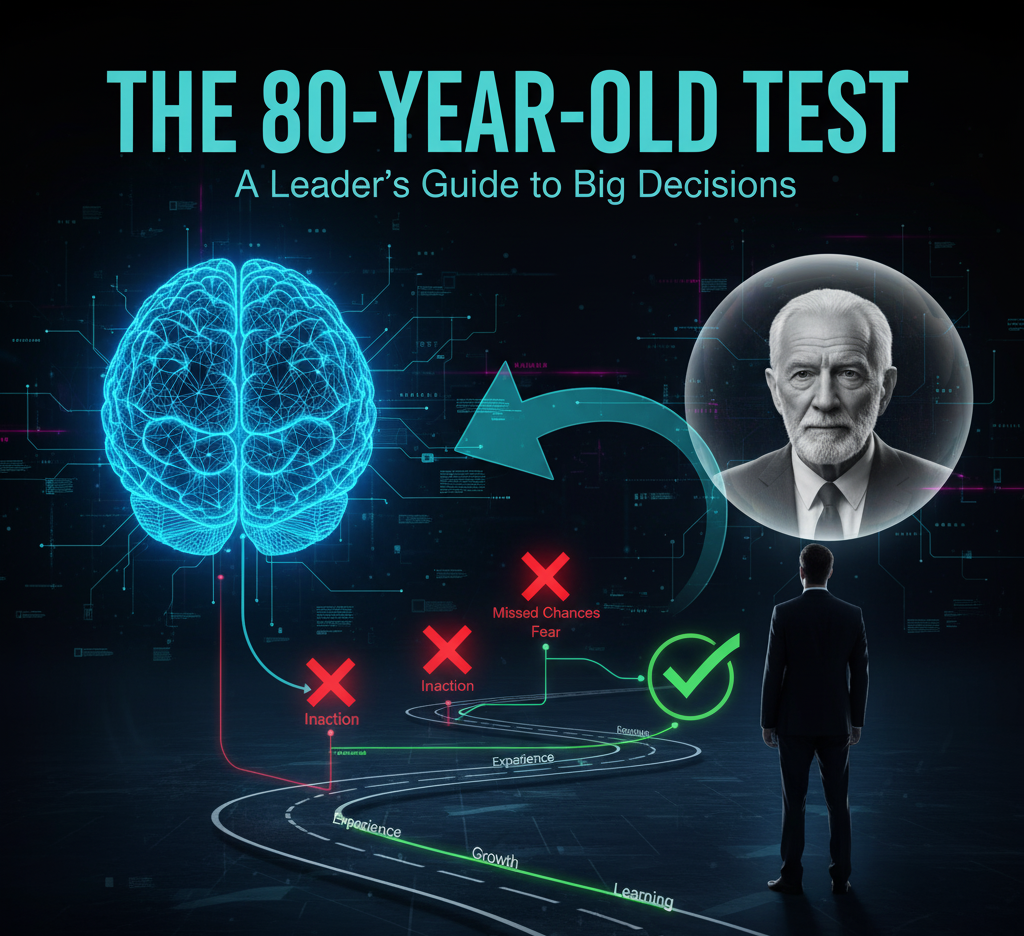
Explanation:
The Regret Minimization Framework is a mental model for making high-stakes decisions by projecting yourself into the future and choosing the path that you will regret the least.
Example:
Jeff Bezos used this framework when he decided to leave his high-paying job, reasoning that at 80, he would deeply regret not trying to start Amazon far more than he would regret trying and failing.
Insight:
The most crucial insight is that this framework systematically overcomes short-term fear, revealing that long-term regret is almost always a product of inaction, not of failure.
The 80-Year-Old Test: A Leader’s Guide to Big Decisions
Leaders get paralyzed by the same types of questions every day. “Should I take this risky new position?” “Should I shut down a legacy project that my team loves?” “Should I leave this stable company to start my own?”
These decisions are agonizing. We get stuck in a “paralysis by analysis,” making endless pros-and-cons lists. But the real reason we’re stuck is that our brains are programmed to overvalue short-term risk and undervalue long-term fulfillment. The immediate fear of failure, embarrassment, or loss feels incredibly loud, drowning out the quiet, internal voice that knows what we truly want.
This is where the Regret Minimization Framework becomes your most powerful tool.
This model, made famous by Jeff Bezos, isn’t about logic; it’s about clarity. It’s designed to do one thing: separate the temporary fears from the permanent regrets.
When Bezos was considering leaving his lucrative Wall Street job to start an “online bookstore,” his boss told him it was a terrible idea. His rational mind saw all the short-term risks: loss of salary, loss of prestige, and a high chance of failure.
But he didn’t make a pros-and-cons list. Instead, he invented the Regret Minimization Framework. He pictured himself at 80 years old, looking back on his life. He then asked himself a simple question: “At 80, will I regret having tried this and failed?”
His answer was “No.” A failure would just be an interesting life experience.
Then he asked the real question: “At 80, will I regret not having tried this at all? Will I spend the rest of my life wondering ‘what if’?”
His answer was “Yes.” He knew that the regret of inaction would haunt him forever. The decision became instantly clear. He had to try.
This framework is a “time machine” for your mind. It transports you past the immediate, noisy, and often irrational fears of the present moment and places you in a future where only the big-picture truths remain.
As a leader, you can use this every week:
- On difficult feedback: “In six months, will I regret having this uncomfortable 20-minute conversation with my employee, or will I regret not having it and watching their performance (and the team’s morale) continue to decline?”
- On innovation: “In five years, will our team regret ‘wasting’ 10% of our budget on a bold experiment that failed, or will we regret not taking the risk and becoming the team that plays it safe and slowly becomes irrelevant?”
The Regret Minimization Framework is your filter against fear. It shows you that the temporary pain of failure is almost always preferable to the permanent, corrosive weight of “what if.”
